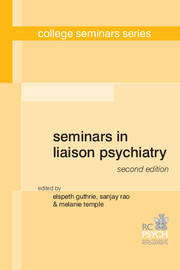Book contents
- Frontmatter
- Contents
- Abbreviations
- List of boxes, tables and figures
- List of contributors
- 1 Basic skills and competencies in liaison psychiatry
- 2 The liaison psychiatry curriculum
- 3 Classification and diagnosis
- 4 Capacity and consent
- 5 Psychological reaction to physical illness
- 6 Medically unexplained symptoms
- 7 Alcohol and substance use in the general hospital
- 8 Accident and emergency psychiatry and self-harm
- 9 Perinatal psychiatry
- 10 General medicine and its specialties
- 11 Liaison psychiatry and surgery
- 12 Neuropsychiatry for liaison psychiatrists
- 13 Psycho-oncology
- 14 Palliative care psychiatry
- 15 Sleep disorders
- 16 Weight- and eating-related issues in liaison psychiatry
- 17 Disaster management
- 18 Liaison psychiatry and older people
- 19 Paediatric liaison psychiatry
- 20 Primary care and management of long-term conditions
- 21 Occupational medicine
- 22 HIV and liaison psychiatry
- 23 Sexual dysfunction
- 24 Psychopharmacology in the medically ill
- 25 Psychological treatments in liaison psychiatry
- 26 Research, audit and rating scales
- 27 Service models
- 28 Developing liaison psychiatry services
- 29 Multiple choice questions and extended matching items
- Appendix 1 Specific competencies
- Appendix 2 Learning objectives with assessment guidance
- Index
21 - Occupational medicine
Published online by Cambridge University Press: 02 January 2018
- Frontmatter
- Contents
- Abbreviations
- List of boxes, tables and figures
- List of contributors
- 1 Basic skills and competencies in liaison psychiatry
- 2 The liaison psychiatry curriculum
- 3 Classification and diagnosis
- 4 Capacity and consent
- 5 Psychological reaction to physical illness
- 6 Medically unexplained symptoms
- 7 Alcohol and substance use in the general hospital
- 8 Accident and emergency psychiatry and self-harm
- 9 Perinatal psychiatry
- 10 General medicine and its specialties
- 11 Liaison psychiatry and surgery
- 12 Neuropsychiatry for liaison psychiatrists
- 13 Psycho-oncology
- 14 Palliative care psychiatry
- 15 Sleep disorders
- 16 Weight- and eating-related issues in liaison psychiatry
- 17 Disaster management
- 18 Liaison psychiatry and older people
- 19 Paediatric liaison psychiatry
- 20 Primary care and management of long-term conditions
- 21 Occupational medicine
- 22 HIV and liaison psychiatry
- 23 Sexual dysfunction
- 24 Psychopharmacology in the medically ill
- 25 Psychological treatments in liaison psychiatry
- 26 Research, audit and rating scales
- 27 Service models
- 28 Developing liaison psychiatry services
- 29 Multiple choice questions and extended matching items
- Appendix 1 Specific competencies
- Appendix 2 Learning objectives with assessment guidance
- Index
Summary
Liaison psychiatrists are becoming increasingly involved in occupational medicine, particularly as common reasons for sickness absence from work include problems with psychological issues and mixed psychological/ physical states. This chapter reviews current research and developments in this area.
Epidemiology of sick leave
Sickness absence is currently a major issue affecting policy makers, health professionals and employers (including the NHS) (Henderson et al, 2005; Black, 2008; Lelliott et al, 2008). The Confederation of British Industry (CBI) estimated that in 2007 sickness absence cost the UK economy £13.2 billion (Confederation of British Industry, 2008). In her major review of the health of the working-age population, Dame Carol Black estimated the total costs of working-age ill health to be over £100 billion. This figure takes into account the costs of benefits, the loss of tax revenue, the healthcare costs and lost productivity (Black, 2008).
Behind these headline figures lie some significant changes that have occurred over the past 20 years. First, the proportion of the working-age population in receipt of long-term benefits has risen sharply. In the 1970s about 2% were claiming the equivalent of incapacity benefit; the current figure is approximately 7% (Fig. 21.1). It should be remembered that this change has occurred over a period where all other indices of population health have shown improvements.
Second, there has been a clear shift in the apparent cause of this long-term sick leave. In the 1970s and 1980s musculoskeletal disorders were the most common cause, but since the mid-1980s there has been a sharp rise in the numbers claiming incapacity benefit for mental health problems (Fig. 21.2).
In one study of GP practices in Liverpool, psychiatric diagnoses accounted for 25% of all sick notes and 40% of all sick days (Shiels et al, 2004; Shiels ' Gabbay, 2007). In 1996, mental health problems made up 21% of incapacity benefit claims (Black, 2008); by 2008 this was 44% (Sainsbury et al, 2008).
- Type
- Chapter
- Information
- Seminars in Liaison Psychiatry , pp. 322 - 329Publisher: Royal College of PsychiatristsPrint publication year: 2012



